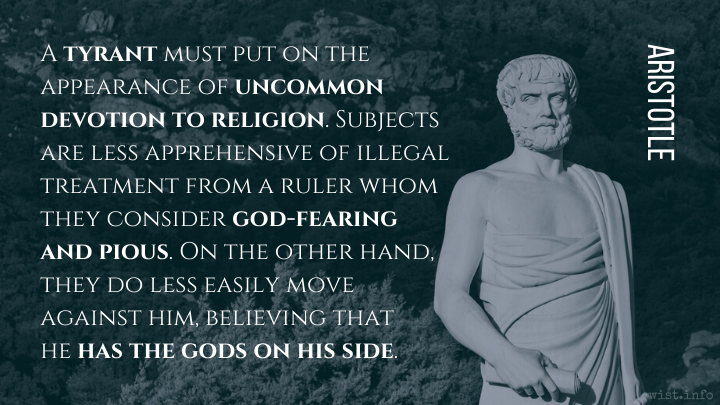Appearances are deceptive.
Aesop (620?-560? BC) Legendary Greek storyteller
Fables [Aesopica], “The Wolf in Sheep Clothing” (6th C BC) [tr. Jacobs (1894)]
(Source)
Alternately, "Appearances often are deceiving." Versified by Gaius Julius Phaedrus, Fables bk. 4, as "Things are not always what they seem."
Note that there are two fables by this name. In this one, a wolf prospers by wearing a sheepskin he finds and drawing other sheep away to be eaten. In other versions, the wolf sneaks into the sheepfold wearing the skin, and then is killed and eaten by the farmer who wants sheep for dinner.
Quotations about:
facade
Note not all quotations have been tagged, so Search may find additional quotes on this topic.
When one sees the number and variety of institutions which exist for the purposes of education, and the vast throng of scholars and masters, one might fancy the human race to be very much concerned about truth and wisdom. But here, too, appearances are deceptive. The masters teach in order to gain money, and strive, not after wisdom, but the outward show and reputation of it; and the scholars learn, not for the sake of knowledge and insight, but to be able to chatter and give themselves airs.
[Wenn man die Vielen und Mannigfaltigen Anstalten zum Lehren und Lernen un das so große Gedränge von Schülern und Meistern sieht, könnte man glauben, daß es dem Menschengeschlechte gar sehr um Einsicht und Wahrheit zu thun sei. Aber auch hier trügt der Schein. Jene lehren, um Geld zu verdienen und streben nicht nach Weisheit, sondern nach dem Schein und Kredit derselben: und Diese lernen nicht, um Kenntniß und Einsicht zu erlangen; sondern um schwätzen zu können nd sich ein Ansehn zu geben Alle dreißig Jahre nämlich tritt so ein sondern um schwätzen zu können und sich ein Ansehn zu geben.]
Arthur Schopenhauer (1788-1860) German philosopher
Parerga and Paralipomena, Vol. 2, ch. 21 “On Learning and the Learned [Über Gelehrsamkeit und Gelehrte],” § 244 (1851) [tr. Saunders (1890)]
(Source)
(Source (German)). Alternate translation:
When we see the different institutions for teaching and learning and the vast throng of pupil and masters, we might imagine that the human race was very much bent on insight and truth; but here appearances are deceptive. The masters teach in order to earn money and aspire not to wisdom, but to the semblance and reputation thereof; the pupils learn not to acquire knowledge and insight, but to be able to talk and chat and to give themselves airs.
[tr. Payne (1974)]
Thousands upon thousands are yearly brought into a state of real poverty by their great anxiety not to be thought poor.
William Cobbett (1763-1835) English politician, agriculturist, journalist, pamphleteer
Advice to Young Men and (Incidentally) to Young Women, Letter 2, #58 (1829)
(Source)
We may also observe that a great many people do many things that seem to be inspired more by a spirit of ostentation than by heart-felt kindness; for such people are not really generous but are rather influenced by a sort of ambition to make a show of being open-handed. Such a pose is nearer akin to hypocrisy than to generosity or moral goodness.
[Videre etiam licet plerosque non tam natura liberales quam quadam gloria ductos, ut benefici videantur, facere multa, quae proficisci ab ostentatione magis quam a voluntate videantur. Talis autem sinulatio vanitati est coniunctior quam aut liberalitati aut honestati.]
Marcus Tullius Cicero (106-43 BC) Roman orator, statesman, philosopher
De Officiis [On Duties; On Moral Duty; The Offices], Book 1, ch. 14 (1.14) / sec. 44 (44 BC) [tr. Miller (1913)]
(Source)
(Source (Latin)). Alternate translations:trans.:
One may also observe in a great many people, that they take a sort of pride in being counted magnificent, and give very plentifully, not from any generous principle in their natures, but only to appear great in the eye of the world; so that all their bounty is resolved into nothing but mere outside and pretense, and is nearer of kin to vanity and folly, than it is to either liberality or honesty.
[tr. Cockman (1699)]
Besides we may observe, that most men, not so much from a liberal disposition, as led by some show of apparent beneficence, do acts of kindness, which seem to flow more from ostentation than from the heart. This conduct is more allied to vanity than to liberality or honour.
[tr. McCartney (1798)]
For it is easy to observe, that most of them are not so much by nature generous, as they are misled by a kind of pride to do a great many things in order that they may seem to be generous; which things seem to spring not so much from good will as from ostentation. Now such a simulation is more nearly allied to duplicity than to generosity or virtue.
[tr. Edmonds (1865)]
We can see, also, that a large number of persons, less from a liberal nature than for the reputation of generosity, do many things that evidently proceed from ostentation rather than from good will.
[tr. Peabody (1883)]
It is also manifest that the conduct of men who are not really generous but only ambitious of the name often springs from vainglory rather than from a pure motive. Such hypocrisy, I hold, savours more of deceit than of liberality or honour.
[tr. Gardiner (1899)]
It is quite clear that many individuals who are not so much innately generous as they are swayed by the vain desire to seem generous, often indulge in gestures that apparently originate in ostentation rather than in genuine open-handedness. This kind of pretense is closer to vanity than to generosity or uprightness.
[tr. Edinger (1974)]
When a resolute young fellow steps up to the great bully, the world, and takes him boldly by the beard, he is often surprised to find it comes off in his hand, and that it was only tied on to scare away the timid adventurers.
Oliver Wendell Holmes, Sr. (1809-1894) American poet, essayist, scholar
Elsie Venner, ch. 2 (1891)
(Source)
Often misattributed to Ralph Waldo Emerson.
But Yahweh said to Samuel, “Take no notice of his appearance or his height for I have rejected him; God does not see as man sees; man looks at appearances but Yahweh looks at the heart.”
The Bible (The Old Testament) (14th - 2nd C BC) Judeo-Christian sacred scripture [Tanakh, Hebrew Bible], incl. the Apocrypha (Deuterocanonicals)
1 Samuel 16:7 [JB (1966)]
(Source)
God rejecting Eliab (and all of David's other brothers) to be the next king. Alternate translations:
But the Lord said unto Samuel, Look not on his countenance, or on the height of his stature; because I have refused him: for the Lord seeth not as man seeth; for man looketh on the outward appearance, but the Lord looketh on the heart.
[KJV (1611)]
But the Lord said to him, “Pay no attention to how tall and handsome he is. I have rejected him, because I do not judge as people judge. They look at the outward appearance, but I look at the heart.”
[GNT (1976)]
But the Lord said to Samuel, “Do not look on his appearance or on the height of his stature, because I have rejected him, for the Lord does not see as mortals see; they look on the outward appearance, but the Lord looks on the heart.”
[NRSV (1989)]
The chief difference between free capitalism and State socialism seems to be this: that under the former a man pursues his own advantage openly, frankly, and honestly, whereas under the latter he does so hypocritically and under false pretences.
Look at a man in the midst of doubt and danger, and you will lean in his hour of adversity what he really is. It is then that true utterances are wrung from the recesses of his breast. The mask is torn off; the reality remains.
It takes a clever man to hide his cleverness.
[C’est une grande habileté que de savoir cacher son habileté.]
François VI, duc de La Rochefoucauld (1613-1680) French epigrammatist, memoirist, noble
Réflexions ou sentences et maximes morales [Reflections; or Sentences and Moral Maxims], ¶245 (1678) [tr. Heard (1917), ¶253]
(Source)
In the 1665 edition, this read: Le plus grand art d’un habile homme est celui de savoir cacher son habileté.
(Source (French)). Alternate translations:
It is a Great Act of Wisdom to be able to Conceal one's being Wise.
[tr. Stanhope (1694), ¶246]
It requires no small degree of ability to know when to conceal it.
[pub. Donaldson (1783), "Ability," ¶4]
It is a great ability to be able to conceal one's ability.
[ed. Gowens (1851), ¶257]
There is great ability in knowing how to conceal one's ability.
[tr. Bund/Friswell (1871), ¶245]
It is the height of art to conceal art.
[tr. Stevens (1939), ¶245]
A very clever man will know how to hide his cleverness.
[tr. FitzGibbon (1957), ¶245]
It is exceedingly clever to know how to hide your cleverness.
[tr. Kronenberger (1959), ¶245]
To conceal ingenuity is ingenuity indeed.
[tr. Tancock (1959), ¶245]
It is great cleverness to know how to hide our cleverness.
[tr. Whichello (2016), ¶245]
It is a great piece of folly to sacrifice the inner for the outer man, to give the whole or the greater part of one’s quiet, leisure, and independence for splendor, rank, pomp, titles and honor.
[Es ist eine große Thorheit, um nach Außen zu gewinnen, nach Innen zu verlieren, d. h. für Glanz, Rang, Prunk, Titel und Ehre, seine Ruhe, Muße und Unabhängingkeit ganz oder großen Theils hinzurgeben.]
Arthur Schopenhauer (1788-1860) German philosopher
Parerga and Paralipomena, Vol. 1, “Aphorisms on the Wisdom of Life [Aphorismen zur Lebensweisheit],” ch. 2 “Personality, or What Man Is [Von dem, was einer ist]” (1851) [tr. Saunders (1890)]
(Source)
(Source (German)). Alternate translation:
It is a great folly to lose the inner man in order to gain the outer, that is, to give up the whole or the greater part of one's quiet, leisure, and independence for splendor, rank, pomp, titles and honors.
[tr. Payne (1974)]
It’s a sign of considerable shrewdness to be able to make others think one is not exceptionally shrewd.
[C’est avoir fait un grand pas dans la finesse, que de faire penser de soi que l’on n’est que médiocrement fin.]
Jean de La Bruyère (1645-1696) French essayist, moralist
The Characters [Les Caractères], ch. 8 “Of the Court [De la Cour],” § 85 (8.85) (1688) [tr. Stewart (1970)]
(Source (French)). Alternate translations:
He is far gone in politicks, who begins to find he is but indifferently politick.
[Bullord ed. (1696)]
He is far gone in Cunning, who makes other People believe he is but indifferently Cunning.
[Curll ed. (1713)]
He is thorough-paced in Cunning, who makes others believe that he is no Conjurer.
[Browne ed. (1752)]
A man must be very shrewd to make other people believe that he is not so sharp after all.
[tr. Van Laun (1885)]
A man has made great progress in cunning when he does not seem too clever to others.
[Common Translation, e.g.]
JAQUES:All the world’s a stage,
And all the men and women merely players.
They have their exits and their entrances,
And one man in his time plays many parts ….William Shakespeare (1564-1616) English dramatist and poet
As You Like It, Act 2, sc. 7, l. 146ff (2.7.146-149) (1599)
(Source)
DUKE: O, what may man within him hide,
Though angel on the outward side!William Shakespeare (1564-1616) English dramatist and poet
Measure for Measure, Act 3, sc. 2, l. 271ff (3.2.271-272) (1604)
(Source)
A tyrant must put on the appearance of uncommon devotion to religion. Subjects are less apprehensive of illegal treatment from a ruler whom they consider god-fearing and pious. On the other hand, they do less easily move against him, believing that he has the gods on his side.
Aristotle (384-322 BC) Greek philosopher
Politics [Πολιτικά], Book 5, ch. 11 / 1314b.39
Alt. trans.:
- "Also he should appear to be particularly earnest in the service of the Gods; for if men think that a ruler is religious and has a reverence for the Gods, they are less afraid of suffering injustice at his hands, and they are less disposed to conspire against him, because they believe him to have the very Gods fighting on his side. At the same time his religion must not be thought foolish." [tr. Jowett (1885)]
- "And, moreover, always to seem particularly attentive to the worship of the gods; for from persons of such a character men entertain less fears of suffering anything illegal while they suppose that he who governs them is religious and reverences the gods; and they will be less inclined to raise insinuations against such a one, as being peculiarly under their protection: but this must be so done as to give no occasion for any suspicion of hypocrisy." [tr. Ellis (1912)]
- "And further he must be seen always to be exceptionally zealous as regards religious observances (for people are less afraid of suffering any illegal treatment from men of this sort, if they think that their ruler has religious scruples and pays regard to the gods, and also they plot against him less, thinking that he has even the gods as allies), though he should not display a foolish religiosity." [tr. Rackham (1932)]
- "Further, he must always show himself to be seriously attentive to the things pertaining to the gods. For men are less afraid fo being treated in some respect contrary to the law by such persons, if they consider the ruler a god-fearing sort who takes thought for the gods, and they are less ready to conspire against him as one who has the gods too as allies. In showing himself of this sort, however, he must avoid silliness." [tr. Lord (1984)]
Law and order is like patriotism — anyone who comes on strong about patriotism has got something to hide — it never fails. They always turn out to be a crook or an asshole or a traitor or something.
Bill Mauldin (1921-2003) American editorial cartoonist, writer
Interview by Donald R. Katz, “Bill Mauldin: Drawing Fire,” Rolling Stone (4 Nov 1976)
(Source)


















